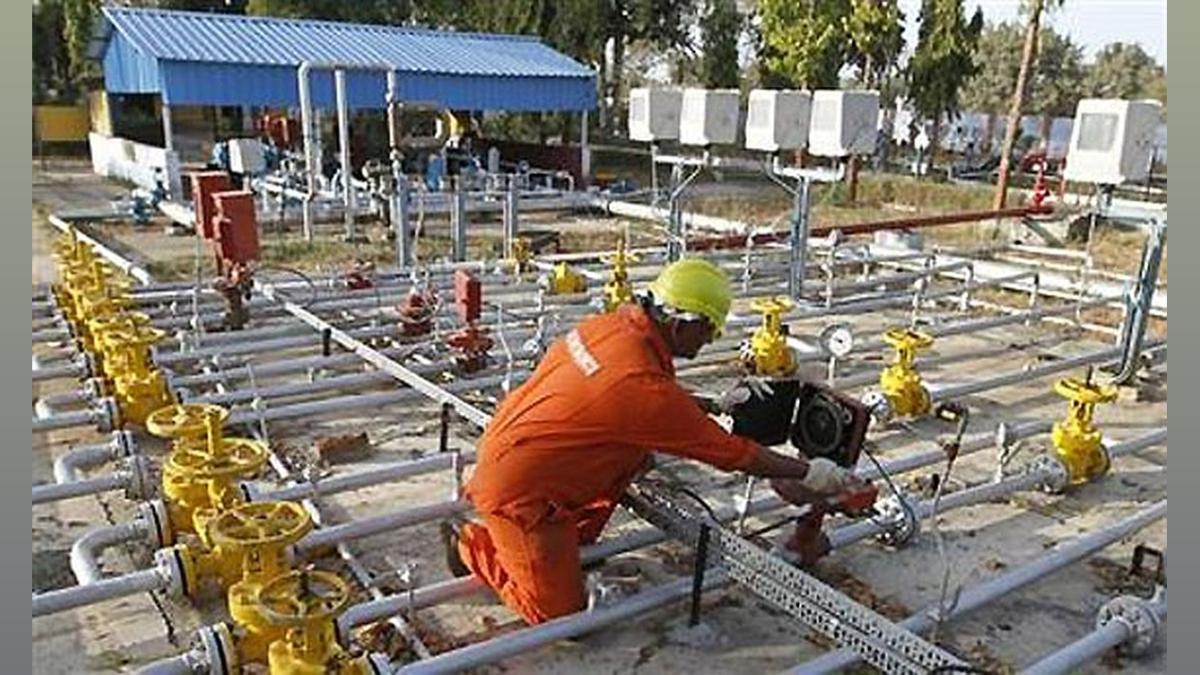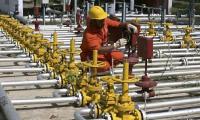India's New Oilfield Regulations Attract Investors - BP CEO
x
BP CEO highlights the positive impact of India's new oil and gas legislation, attracting foreign investors and boosting domestic production. The reforms aim to improve ease of doing business and attract global players.

New Delhi, Apr 9 (PTI) India's upstream oil and gas policy overhaul through a new legislation has made several improvements important for foreign investors that can help attract global players, global energy giant BP's CEO said.
Parliament last month passed a bill that amended the Oil Fields (Regulation and Development) Act of 1948 by expanding its scope to include shale oil, shale gas and coal bed methane, in addition to oil and gas, while introducing sweeping measures aimed at improving the ease of doing business as well as providing fiscal and policy stability aimed to attract domestic and international investment.
The new legislation "made several improvements that are important for foreign investors like us," BP CEO Murray Auchincloss told PTI in an interview.
The BP CEO was in India earlier this month, during which he met Prime Minister Narendra Modi as well as Oil Minister Hardeep Singh Puri.
"We believe the reforms can help mitigate risks and ensure operational clarity, creating an investor-friendly environment, supporting the modernisation of India's oil and gas sector, and attracting global players," he said.
He was deeply appreciative of the amendments made in the oilfield act to ease the way for increased foreign investment. He assured the Prime Minister that BP was working to support India's energy needs in line with Modi's vision of energy security for India with support from the ministry.
The new law gives policy stability and improved financial terms through a series of changes to the decades-old act. These include freedom to pursue international arbitration in the event of disputes, as well as offering a longer lease period.
India, which is 85 per cent dependent on imports for meeting its oil needs and buys nearly half of its gas needs from overseas, in recent years has undertaken a series of upstream reforms aimed at encouraging discovery of more oil and gas through increased exploration and bringing them to production quickly.
These include greater marketing freedom to producers and allowing companies to carve out areas for oil and gas exploration under the Open Acreage Licensing Policy (OALP).
BP already partners Reliance Industries in the eastern offshore KG-D6 block that produces about 28 million standard cubic metres of natural gas per day.
Last year, BP and Reliance teamed up with state-owned Oil and Natural Gas Corporation (ONGC) to bid for an oil and gas exploration block.
Both Modi and Puri encouraged BP to participate in the current bid round under OALP.
"I encouraged the energy supermajor to aggressively participate in the 10th Round of OALP, the largest bidding round of over 2 lakh sq kms and the first one after the passage of the landmark ORD Act, 2025," Puri had said after meeting the BP CEO last week.
On the bid in OALP-IX round, Auchincloss said Reliance Industries and BP teamed up with ONGC for the OALP-IX bid round to "strengthen our bid for exploration rights in the Gujarat-Saurashtra basin."
"This was our first collaboration, bringing together ONGC's experience as India's largest oil and gas producer alongside the Reliance-BP joint venture's technical expertise and private sector agility. We believe such an approach supports India's aim of boosting domestic production and reducing reliance on imports by attracting investment through OALP. Our collaboration, sharing knowledge and expertise, has the potential to improve efficiency in exploration and production processes," he said.
Besides upstream, BP also has a substantial presence in the downstream sector through its joint venture with Reliance Jio. Jio-BP has close to 2,000 petrol pumps in the country and is setting up a chain of EV charging stations.
"We aim to be a leader in mobility and first choice for our customers. We expect to see increasing demand in India for fuels and EV charging -- and we are integrating to serve customers more efficiently, no matter what they drive," he said.
"Our downstream retail JV with Reliance Jio-bp, delivering retail fuels, convenience, aviation fuels, biofuels, EV charging and LNG for trucking is doing really well and we expect to see substantial growth. We're investing in advantaged and integrated positions where our brands, products and services can drive greater margins -- and continuing to high grade our network of sites."
Auchincloss said the Indian economy is expected to continue to be one of the most dynamic in the world, underpinned by its growing population, continued industrialisation and rising prosperity.
"It's likely to be the single biggest contributor to global energy demand growth in the years ahead, increasing its consumption of all forms of energy, with its natural gas demand growing especially rapidly over the coming years," he said.
BP, he said, is looking to grow its portfolio of marketing domestic gas and imported LNG to commercial and industrial customers.
"We aim to grow the portfolio through aggregating LNG demand and supplying this, leveraging our global LNG trading capabilities, and to grow our presence in the downstream gas value chain. And in fuels and convenience, we expect to see increasing demand for fuels including bio CNG and EV charging -- and through our Jio-bp joint venture we are integrating to serve customers more efficiently," he said.
Parliament last month passed a bill that amended the Oil Fields (Regulation and Development) Act of 1948 by expanding its scope to include shale oil, shale gas and coal bed methane, in addition to oil and gas, while introducing sweeping measures aimed at improving the ease of doing business as well as providing fiscal and policy stability aimed to attract domestic and international investment.
The new legislation "made several improvements that are important for foreign investors like us," BP CEO Murray Auchincloss told PTI in an interview.
The BP CEO was in India earlier this month, during which he met Prime Minister Narendra Modi as well as Oil Minister Hardeep Singh Puri.
"We believe the reforms can help mitigate risks and ensure operational clarity, creating an investor-friendly environment, supporting the modernisation of India's oil and gas sector, and attracting global players," he said.
He was deeply appreciative of the amendments made in the oilfield act to ease the way for increased foreign investment. He assured the Prime Minister that BP was working to support India's energy needs in line with Modi's vision of energy security for India with support from the ministry.
The new law gives policy stability and improved financial terms through a series of changes to the decades-old act. These include freedom to pursue international arbitration in the event of disputes, as well as offering a longer lease period.
India, which is 85 per cent dependent on imports for meeting its oil needs and buys nearly half of its gas needs from overseas, in recent years has undertaken a series of upstream reforms aimed at encouraging discovery of more oil and gas through increased exploration and bringing them to production quickly.
These include greater marketing freedom to producers and allowing companies to carve out areas for oil and gas exploration under the Open Acreage Licensing Policy (OALP).
BP already partners Reliance Industries in the eastern offshore KG-D6 block that produces about 28 million standard cubic metres of natural gas per day.
Last year, BP and Reliance teamed up with state-owned Oil and Natural Gas Corporation (ONGC) to bid for an oil and gas exploration block.
Both Modi and Puri encouraged BP to participate in the current bid round under OALP.
"I encouraged the energy supermajor to aggressively participate in the 10th Round of OALP, the largest bidding round of over 2 lakh sq kms and the first one after the passage of the landmark ORD Act, 2025," Puri had said after meeting the BP CEO last week.
On the bid in OALP-IX round, Auchincloss said Reliance Industries and BP teamed up with ONGC for the OALP-IX bid round to "strengthen our bid for exploration rights in the Gujarat-Saurashtra basin."
"This was our first collaboration, bringing together ONGC's experience as India's largest oil and gas producer alongside the Reliance-BP joint venture's technical expertise and private sector agility. We believe such an approach supports India's aim of boosting domestic production and reducing reliance on imports by attracting investment through OALP. Our collaboration, sharing knowledge and expertise, has the potential to improve efficiency in exploration and production processes," he said.
Besides upstream, BP also has a substantial presence in the downstream sector through its joint venture with Reliance Jio. Jio-BP has close to 2,000 petrol pumps in the country and is setting up a chain of EV charging stations.
"We aim to be a leader in mobility and first choice for our customers. We expect to see increasing demand in India for fuels and EV charging -- and we are integrating to serve customers more efficiently, no matter what they drive," he said.
"Our downstream retail JV with Reliance Jio-bp, delivering retail fuels, convenience, aviation fuels, biofuels, EV charging and LNG for trucking is doing really well and we expect to see substantial growth. We're investing in advantaged and integrated positions where our brands, products and services can drive greater margins -- and continuing to high grade our network of sites."
Auchincloss said the Indian economy is expected to continue to be one of the most dynamic in the world, underpinned by its growing population, continued industrialisation and rising prosperity.
"It's likely to be the single biggest contributor to global energy demand growth in the years ahead, increasing its consumption of all forms of energy, with its natural gas demand growing especially rapidly over the coming years," he said.
BP, he said, is looking to grow its portfolio of marketing domestic gas and imported LNG to commercial and industrial customers.
"We aim to grow the portfolio through aggregating LNG demand and supplying this, leveraging our global LNG trading capabilities, and to grow our presence in the downstream gas value chain. And in fuels and convenience, we expect to see increasing demand for fuels including bio CNG and EV charging -- and through our Jio-bp joint venture we are integrating to serve customers more efficiently," he said.






 © 2025 Rediff.com India Limited. All rights reserved.
© 2025 Rediff.com India Limited. All rights reserved.